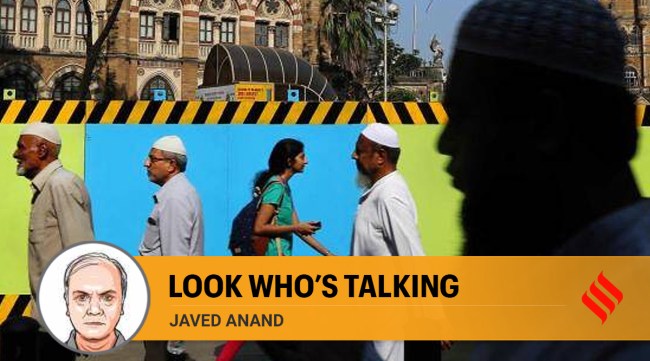Opinion Javed Anand writes: Of course, UCC is reform but look who’s talking
Muslim women need freedom from patriarchs of Indian Islam -- but their problems are not limited to a discriminatory family law. Ask the hate brigade
 What does/would a UCC look like? No one knows, since no draft has ever been placed before the public. (Express file photo by Nirmal Harindran)
What does/would a UCC look like? No one knows, since no draft has ever been placed before the public. (Express file photo by Nirmal Harindran) Taken at face value, Prime Minister Narendra Modi and progressive Muslims, women and men, are on the same page. Both are in favour of a Uniform Civil Code (UCC) which is part of the Directive Principles (Article 44) of the Indian Constitution and to which the Supreme Court has often drawn the nation’s attention. However, beyond the surface appearance, lies a wide gulf between the PM, his party and parivar, and the progressives.
 For progressives committed to secular democratic values, it’s a question of principles: Gender equality, gender justice. On the other side, it’s a worldview rooted in the ideology of Hindutva, it’s a matter of “headline management” and majoritarian politics.
For progressives committed to secular democratic values, it’s a question of principles: Gender equality, gender justice. On the other side, it’s a worldview rooted in the ideology of Hindutva, it’s a matter of “headline management” and majoritarian politics.Progressives support a UCC that is applicable to all citizens, religion-neutral and gender-just, irrespective of caste, community, religion. The PM’s posturing suggests that for him the UCC is all about the “liberation” of “our Muslim behen-betis”. No doubt Muslim Personal Law is grossly unjust, blatantly anti-women and in need of reforms here and now. But here is a question: Are the existential problems of Muslim behen-betis limited to a discriminatory family law?
What about justice to Bilkis Bano? What about the plight of Muslim behen-betis who, along with their families, are today rendered homeless overnight — without due process — under the diktats of “Bulldozer Baba” and “Bulldozer Mama”?
What about the plight of Muslim women whose men were lynched by “gau rakshaks”? What about the websites launched by those who call themselves Modi bhakts for auctioning Muslim women? What about the sadhus and sants who use dharam sansad platforms to call for the economic boycott of Muslims and violence against them? What about the “rape-Muslim-women” calls issued by sundry sadhus and sadhvis across the country?
All this, and much else, has been the lot of Muslim behen-betis (forget Muslim men) since 2014. Yes, yes, we all have repeatedly heard the pious chant: “Sabka saath, sabka vikas, sabka vishwas”. But does anyone recall a word from the PM of comfort and assurance to “our Muslim behen-betis” subjected to humiliation, intimidation, rape threats and worse?
Who would deny that Muslim women are in urgent need to be freed from the shackles of the patriarchs of Indian Islam pretending to be saviours of the shariah? But who would be swayed by the PM’s show of selective compassion with a sharp eye on the coming polls?
Since the late 1990s, UCC has been part of the three-point divisive agenda of the Hindutva brigade: Ram Mandir in Ayodhya (where the Babri Masjid once stood), abrogation of Article 370 (concerning the status of J&K) and UCC.
What does/would a UCC look like? No one knows, since no draft has ever been placed before the public. Deliberately so, since the motive is simple: Come elections, reignite the UCC question. What next? Secular parties will hide behind the initiative-must-come-from-within-the-community line while Muslim religious bodies will as usual cry out: No interference in sharia law will be tolerated. Bingo! That’s sufficient ammunition for Hindutva’s propaganda machinery to go into overdrive, tell Hindus that for Muslims it’s always sharia before the samvidhan, accuse secular parties of “Muslim appeasement”.
It’s a tactic that so far has served the Hindu majoritarians well. With elections due in several states in the coming months and general elections due within a year, is the latest UCC pitch a repeat of the same old trick? Or is it that in the Hindu majoritarian calculation there is more to be politically gained now by bulldozing a UCC law through Parliament before 2024? Or possibly in the monsoon session itself with an advanced general election? We will have the answer in the coming months.
Meanwhile, following an entirely different trajectory, progressive Muslims support the idea of a religion-neutral, gender-just UCC. Here are the reasons. One, it is a constitutional directive. Two, contrary to the false claims of the Indian ulema, Muslim Personal Law is not god-given but man-made. Millions of believing, practising Muslims today are citizens of western democracies where there are no separate family laws for Muslims. In recent decades, a large and growing number of Muslim countries, including some which call themselves Islamic states, have reformed their family laws. But in secular India the ulema continue to cling to medieval, patriarchal notions of gender relations in the name of protecting Islam.
Having lost all hope in their religious leaders ever accepting, let alone initiating change, progressive Muslim women and men have no option but to look to the courts and the government of the day for a religion-neutral, gender-just UCC.
At the same time, progressive Muslims oppose the communalisation of a secular idea – UCC — and its weaponisation in every electoral battle. The Constitution talks of the state’s “endeavour” to bring about a UCC. A bonafide endeavour must mean open nationwide deliberations, discussion and debate involving all stakeholders. A bulldozer UCC militates against the spirit of the constitutional directive.
A bonafide UCC must necessarily be religion-neutral, with gender justice and the best interests of children as its sole focus. Among other things, such a family law applicable to all citizens would include the following: Divorce only through a court of law including the right of women to initiate it, right to judicious maintenance following severance of the marital tie, ban on polygamy and the shameful halala practice, gender-just inheritance and guardianship laws, right to make a will with provision for a minimum percentage of the property to be left behind for heirs, child custody to be based on what is in the best interests of the minor, right to adoption to all citizens. And, not to forget, abolish the tax exemptions enjoyed by Hindus only under the Hindu Undivided Family (HUF) umbrella.
Finally, the Directive Principles also call for “prohibiting the slaughter of cows and calves and other milch and draught cattle” (Article 48). Why, then, do BJP governments not follow a Uniform Beef Code (UBC) across India?
The writer is convener, Indian Muslims for Secular Democracy and co-editor, Sabrang India online






